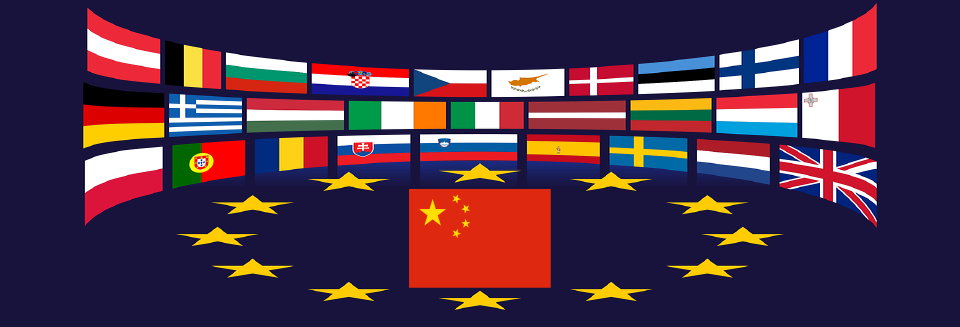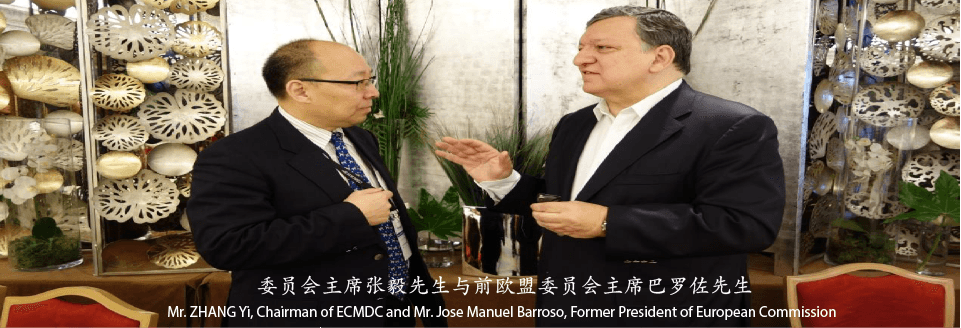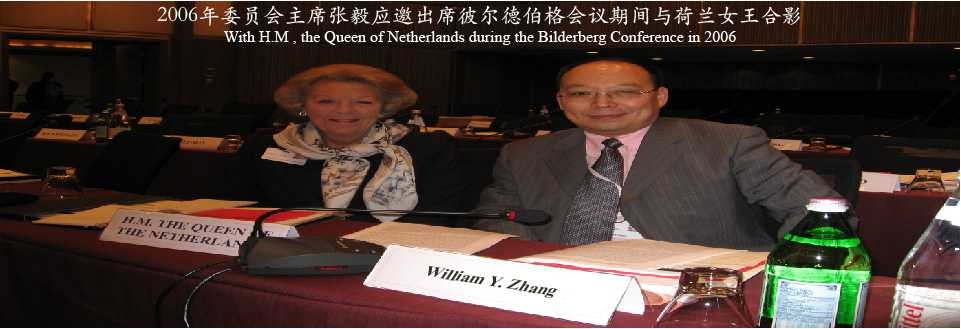Chairman ZHANG Yi Attends Horasis Global Meeting
2016-06-13
On June 13th, 2016, Chairman ZHANG Yi was invited to be the co-host and the speaker on the Opening Plenary of Horais Global Meeting, which was held in Liverpool, U.K. He explicated his views on the topic “Visions for Tomorrow: from Uncertainty to Confidence” and advocated to enhance the confidence of different people from different cultural backgrounds as for the mutual recognition through the dialogues and the down-to-earth cooperation. He believed that the joint efforts would solve the increasing uncertainties that pervaded the whole world.
2016 Horasis Global Meeting is hosted by Horasis, the independent international organization and is co-hosted by Liverpool City Council and International Festival for Business (IFB). Horasis was established in 2005 in Zurich, Switzerland with the commitment to enact visions for a sustainable future-building it into today’s global platform for cooperation between emerging and developed markets. Mr. Frank-Jurgen Richter is the founder and Chairman of Horasis, he is also the good friend of Mr. ZHANG Yi for many years. IFB, the co-host of Horasis Global Meeting is the large-scale commercial cooperation event undertaken by the government of U. K. with the mission to boost the regional economy of northern Britain. IFB is also the famous city name card of Liverpool. IFB is held annually and has become the UK’s most significant international trade and commerce showcase since 1951. IFB with the duration of 3 weeks always attracts international partners to visit Liverpool.
Mr. George Osborne, the Chancellor of the Exchequer, U.K. attended the Grand Opening of IFB 2016 and delivered his speech. Mr. Joe Anderson, Mayor of Liverpool delivered his welcome speech at Horasis Global Meeting in the wake of the Grand Opening.
As the Co-Chair of Horasis Global Meeting, Mr. ZHANG Yi, Ms. Shaikha AI Maskari, Chairwoman of AI Maskari Holding of UAE, Mr. Martin Richenhagen, Chairman of AGCO Corporation of USA, and Mr. Antonio Simoes, Chief Executive of HSBC Bank jointly hosted the Opening Plenary and carried out the discussion on the topic “Where are we at? Where are we going?”
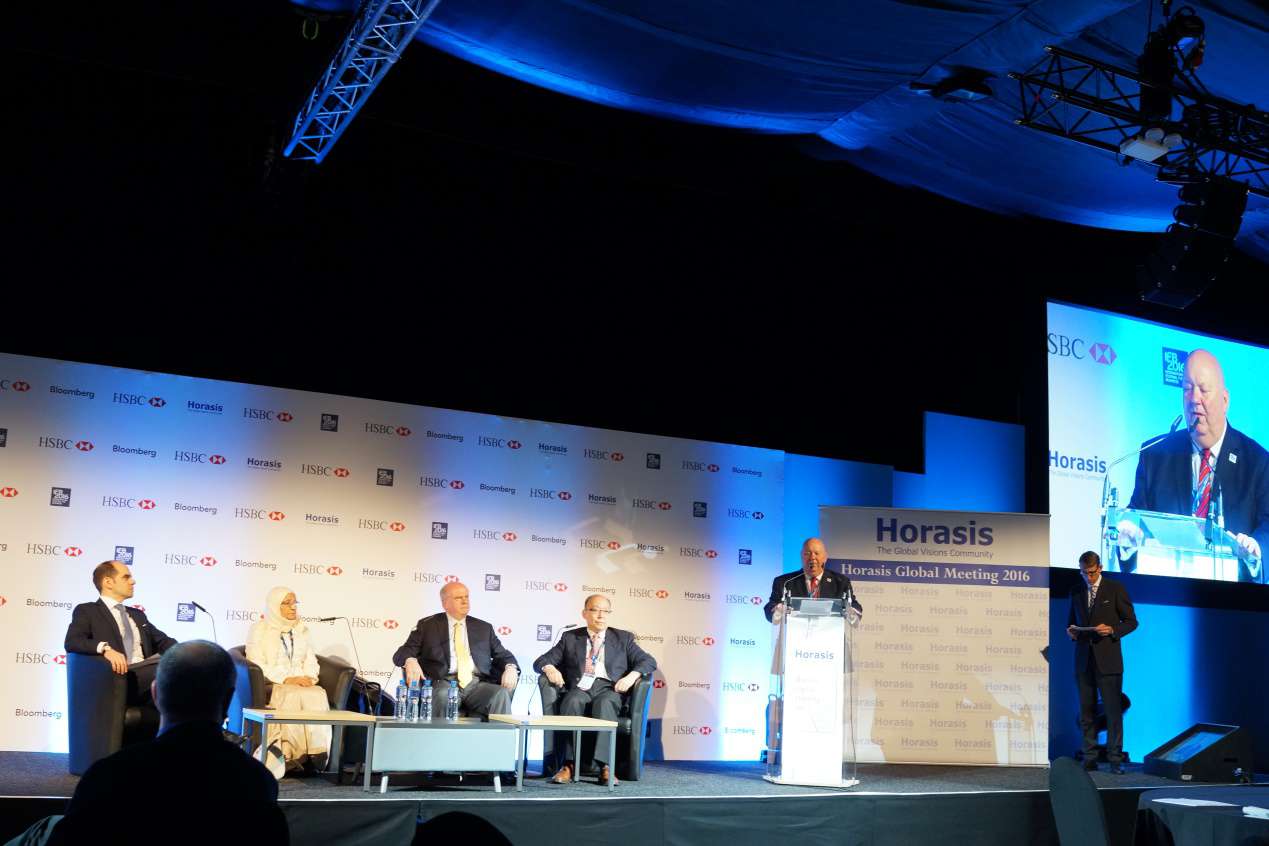
Mr. Joe Anderson (Standing) is delivering his welcome speech.
Mr. ZHANG Yi and Ms. Shaikha AI Maskari (Left Two), Mr. Martin Richenhagen (Right Two), Mr. Antonio Simoes (Left One)
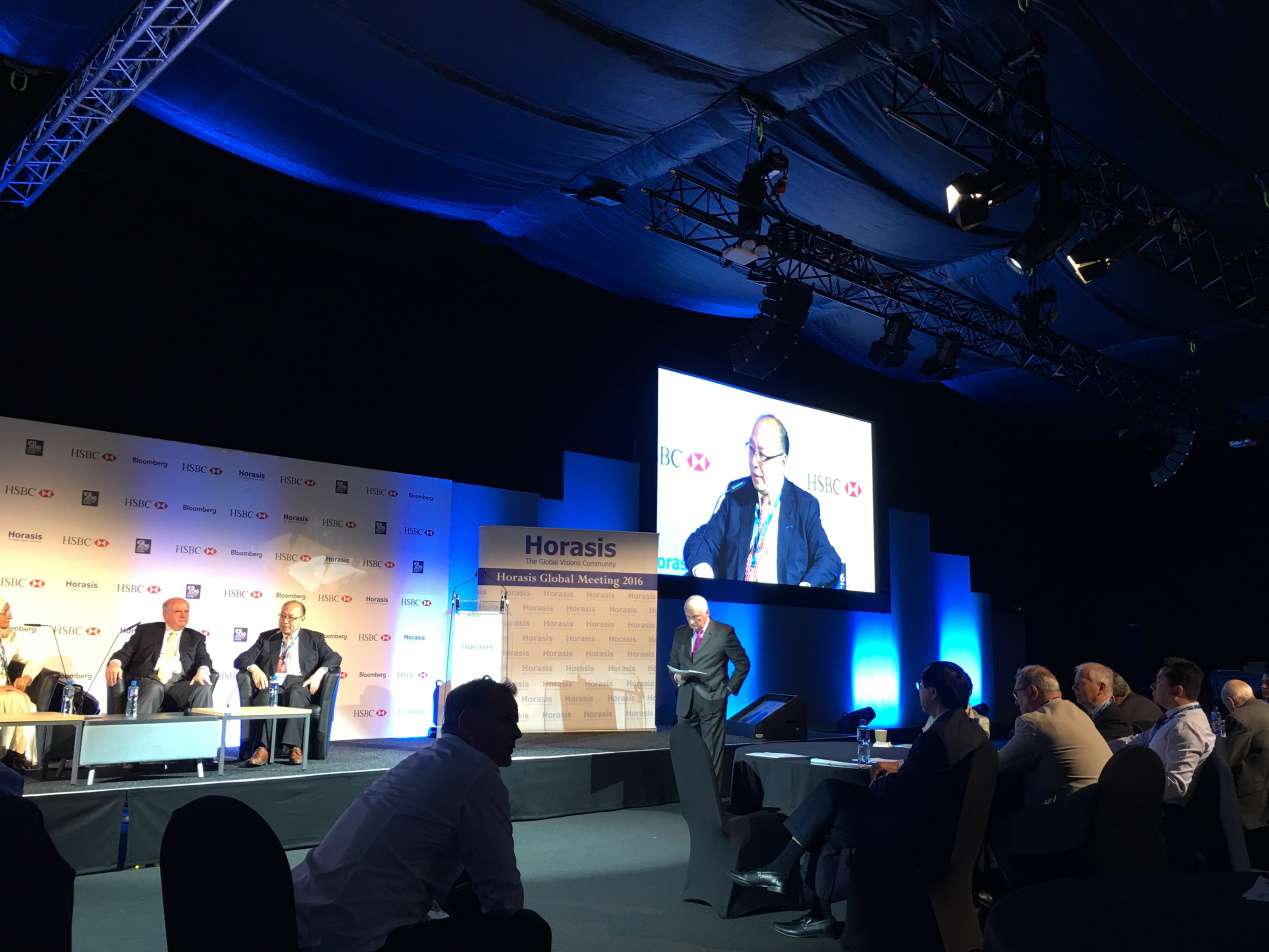
In the discussion, Mr. ZHANG Yi systematically presented his view on the uncertainties that had pervaded the whole world of today. He said, in the globalization of today, the advanced technologies could not replace the dialogues and people-to-people communication. The origin of the endless disputes was traced back to the fact that the concerned parties had been habituated to their own perspectives on the world, while ignoring or neglecting the existence of the others. Thus, the conflicts were unavoidable and the global uncertainties were inevitable. Mr. ZHANG Yi proposed that it should be more channels for the dialogues and the chances for cooperation with a view to enhancing the mutual understanding and trust among the concerned parties. On the basis of this fact, the solidarity could be achieved through the tangible cooperation projects. He made an example of EU-China Sci-Tech Financial Center of ECMDC and expounded the background of its establishment and its guiding principle. Mr. ZHANG Yi’s view, “Unity through Cooperation” had won the universal recognition and thunderous applauses among the present audiences.
In the following special discussions, many famous politicians and the celebrities of different circles had aired their opinions as for the global hot topics. The atmosphere of the meeting was very lively with different schools of thinking converging, from which all the audiences benefited. Mr. ZHANG Yi met with Mr. Kris Peeters, Deputy Prime Minister of Belgium who was invited to attend the meeting and deliver the keynote speech. Both parties had exchanged their views to the full as for the topics in which they were interested.
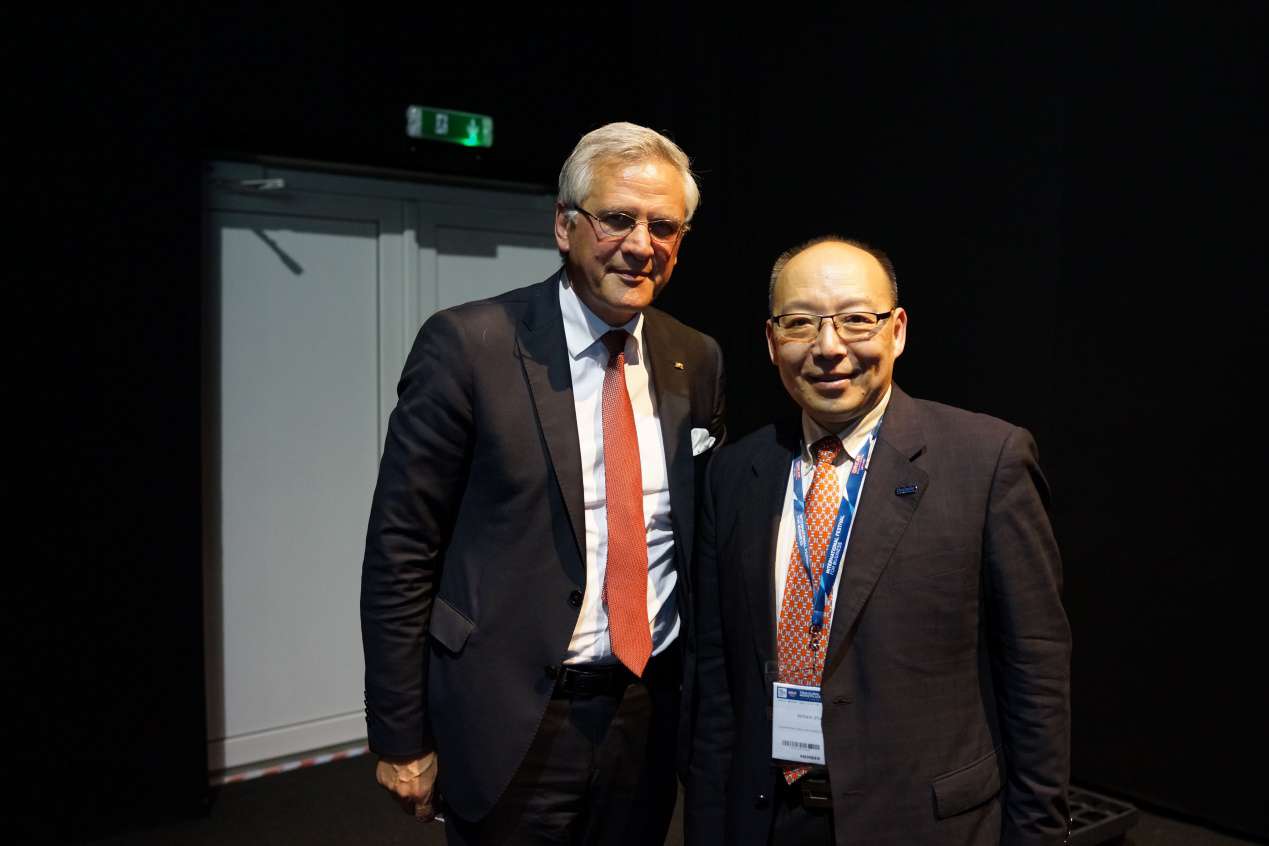
Mr. ZHANG Yi and Mr. Kris Peeters
Annex:
Horasis Global Meeting
ZHANG Yi
Chairman of EU-China Municipal Development Commission
Dear friends,
I extend my great gratitude to Mr. Frank-Jurgen Richter who has invited me to be on the opening plenary. I am delighted to have a chance to share my own opinion with all the attendees. Horasis has set the topic of this discussion, that is, “Where are we at? Where are we going?” I think, before we answer both questions, we should add the pre-condition question, who are we? When we connect these three questions, we find we are tackling with the ultimate question with which the philosophers are confronted.
In 2005, Mr. Thomas Friedman, American writer published his book The World is Flat. This book immediately became the famous best-seller in U.S., and it had been translated into Chinese soon as well. At that time, the Chinese version of this book was nearly on everybody’s lips. 11 years ago, just like all the other readers, I was overwhelmed with the joys at the prospect of the better world brought forth by the internet technology. I once believed that there would surely be a more harmonious earth village when the new technology could obviate all the obstacles to the communication between different nations. 11 years later, all of us are disappointed at the fact that the world that has been flattened by the internet is not peaceful, in which every nation is facing its own challenges, that is the reason why the first debate of Horasis Global Meeting is on the uncertainties of the world.
As we all know, when we are familiar with something and know somebody well, we will have the confidence. When we are confident, we tend to embrace the world with the positive attitudes. In the meanwhile, we are anxious and concerned with those unfamiliar objects. The outcome of uncertainties would be the ensuing action, to instinctively protect ourselves. For us, it will be considered as the natural act, but in the eyes of the others, that might be aggressive and hostile. So, when we come to realize that the world’s economic and geo-political framework is increasingly characterized by uncertainties, we should ask ourselves, who are we? What is the difference that distinguishes us from the others? Are we familiar with ourselves? Do we know the others? In my opinion, to understand the others is the very beginning of the human cognition.
Actually, in the age of internet, we tend to have such a false understanding and such a misjudgment, that is, it seems that we know everything. We are living in our own world with the door closed to the others. We will make a fuss over those trivial things of our own, while turning a blind eye to the miseries of the others. We will usually forgive our own mistakes, while holding the bitter hatred towards the others who have made the same mistakes. We are habituated to ourselves, while neglecting the fact that those strange others with whom we feel uneasy are exactly the mortals with the same blood and flesh as us.
It flashes upon me The Merchant of Venice by William Shakespeare. In any brief introduction to this famous play, Shylock would be described as the vicious Jew who plotted to make the attempt on the life a virtuous Christian. When we are familiar with the statement that Shylock is the Jewish other, who is frightening and different from the Christians, we should hear his own words in the play: “I am a Jew. Hath not a Jew eyes? Hath not a Jew hands, organs, dimensions, senses, affections, passions; fed with the same food, hurt with the same weapons, subject to the same diseases, healed by the same means, warmed and cooled by the same winter and summer as a Christian is? If you prick us do we not bleed? If you tickle us do we not laugh? If you poison us do we not die? And if you wrong us shall we not revenge?” Obviously, Jews and Christians are the same mortals, and there will be no difference between us and the others.
When we are analyzing the economic and geo-political affairs of the world with the features of increasing uncertainties, we come to realize that all of the discords are traced back to the double standards adopted by us out of our human weakness. We are loose with ourselves, while being strict with the others. We are habituated to the measure with which we tend to cover a simple and evident fact, injustice with our endless complex interpretations. Therefore, the questions “Where are we at? Where are we going?” should be paraphrased as, when we are facing the human weakness, do we have the courage to admit that the others would be like us who expect the same respect and understanding? In my opinion, if we acknowledge it and follow it, it would be the first step we will take to stop the trend of the world characterized with the increasing uncertainties.
I have to admit, the reality is complicated. It is not enough for us to reverse the human weakness and inertia only with our goodwill. If we want the global affairs to move in a positive direction as we have expected, we should create more and more opportunities that enable us to carry out the cooperation with the others. At Sanya International Forum of China on December 13th, 2015, I delivered the speech entitled as “Unity through Cooperation”. I have presented my view, that is to construct the community of destiny along with the strange others through the efforts of seeking the convergence of mutual interests on the reliance of different channels of communication and cooperation. Today, I would like to make an example of the ongoing project, EU-China Sci-Tech Financial Center undertaken by us.
Right now, China is at the stage of deepening the reform and broadening the opening-up. China is also at the economic transition in order to realize the sustainable development. During this course, there will be the actual demands for the work of introducing advanced technologies and concepts from foreign countries to China. For this reason, our Commission and partners from Europe and China jointly establish the cooperation platform, EU-China Sci-Tech Financial Center. The mission of this Center is to bring the effort of learning, studying advanced European technologies to the full and enable these technologies to be fully integrated into the vast market of China and its demands of development. The Center will be focused on science and technology by virtue of the financial leverage with a view to boosting the regional economy and municipal development of the concerned Chinese and European regions. The Center will become the benchmark of Sino-European cooperation. In the meanwhile, the successful and unsuccessful experiences accumulated during this course could serve as the references to the other developing countries in Asia, Africa and South American. When we integrate three elements, Sino-European cooperation (the international cooperation in a wider scope in the future), sci-tech innovation and financial support into the entity, the project of EU-China Sci-Tech Financial Center, I believe, we have sufficient space to accommodate the strange others with different cultural backgrounds, and the strangeness in the others usually inspires us to realize our innovation. It is through the down-to-earth cooperation that we and the others can learn from each other and become the trustworthy partner to form the solidarity.
I believe, if we can know ourselves and the others through countless cooperation projects like EU-China Sci-Tech Financial Center, we will foment the unity through cooperation, then, we will be definitely clear with the answer to the question, where the future world will lead to.


